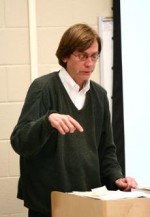Professors speak out against war in Iraq

More than two trillion dollars have been spent, 4,396 American soldiers are dead and 100,000 soldiers are seeking psychological treatment. Michael Decker, John Napora and Abdelwahab Hechiche, professors of history, anthropology and government affairs, respectively, went beyond statistics to tell a crowd of approximately 100 about the five-year-long war in Iraq on Thursday.
They described the tangible costs of the war – the financial costs, the human costs and the costs to the American image abroad.
Napora began the event by describing the Iraqi insurgency and explaining the reasons for Iraqi resistance. Napora said that insurgents consider participation in the war as a matter of honor and that many of those who fight believe that American occupation is a slight to Iraqi sovereignty.
Decker followed the speech by showing a short video detailing the events leading up to the war. Explaining that the roots of this conflict go back more than 50 years – to American involvement in the deposition of the Iranian prime minister in favor of installing the Shah.
Hechiche then spoke about Iraqi history, though his portion focused more on the lack of debate between the United States and its allies over the war. He also questioned whether the cost has been worth it, especially as Iraq cannot be considered a model for other Arab states to follow as originally intended.
After the speeches, the first question asked was about how the professors balanced a platform of administrative criticism – none support the war or the Bush administration – while maintaining support for the troops in Iraq.
“I don’t think, really, that there’s any conflict whatsoever,” Napora said. “Where I had the problem and where it’s difficult is having students who were in my class and now they’re going back. That makes it tough. Any teacher feels some connection to their students and wishes the best for them.”







